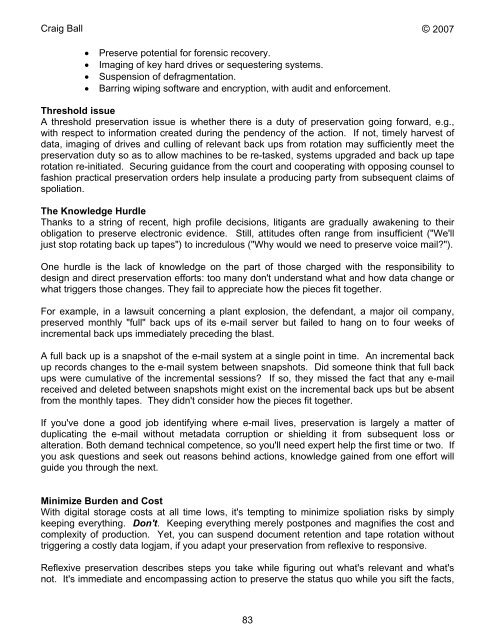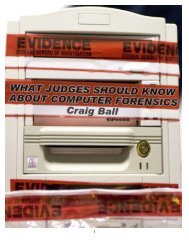Six Articles on Electronic - Craig Ball
Six Articles on Electronic - Craig Ball
Six Articles on Electronic - Craig Ball
You also want an ePaper? Increase the reach of your titles
YUMPU automatically turns print PDFs into web optimized ePapers that Google loves.
<strong>Craig</strong> <strong>Ball</strong> © 2007<br />
• Preserve potential for forensic recovery.<br />
• Imaging of key hard drives or sequestering systems.<br />
• Suspensi<strong>on</strong> of defragmentati<strong>on</strong>.<br />
• Barring wiping software and encrypti<strong>on</strong>, with audit and enforcement.<br />
Threshold issue<br />
A threshold preservati<strong>on</strong> issue is whether there is a duty of preservati<strong>on</strong> going forward, e.g.,<br />
with respect to informati<strong>on</strong> created during the pendency of the acti<strong>on</strong>. If not, timely harvest of<br />
data, imaging of drives and culling of relevant back ups from rotati<strong>on</strong> may sufficiently meet the<br />
preservati<strong>on</strong> duty so as to allow machines to be re-tasked, systems upgraded and back up tape<br />
rotati<strong>on</strong> re-initiated. Securing guidance from the court and cooperating with opposing counsel to<br />
fashi<strong>on</strong> practical preservati<strong>on</strong> orders help insulate a producing party from subsequent claims of<br />
spoliati<strong>on</strong>.<br />
The Knowledge Hurdle<br />
Thanks to a string of recent, high profile decisi<strong>on</strong>s, litigants are gradually awakening to their<br />
obligati<strong>on</strong> to preserve electr<strong>on</strong>ic evidence. Still, attitudes often range from insufficient ("We'll<br />
just stop rotating back up tapes") to incredulous ("Why would we need to preserve voice mail?").<br />
One hurdle is the lack of knowledge <strong>on</strong> the part of those charged with the resp<strong>on</strong>sibility to<br />
design and direct preservati<strong>on</strong> efforts: too many d<strong>on</strong>'t understand what and how data change or<br />
what triggers those changes. They fail to appreciate how the pieces fit together.<br />
For example, in a lawsuit c<strong>on</strong>cerning a plant explosi<strong>on</strong>, the defendant, a major oil company,<br />
preserved m<strong>on</strong>thly "full" back ups of its e-mail server but failed to hang <strong>on</strong> to four weeks of<br />
incremental back ups immediately preceding the blast.<br />
A full back up is a snapshot of the e-mail system at a single point in time. An incremental back<br />
up records changes to the e-mail system between snapshots. Did some<strong>on</strong>e think that full back<br />
ups were cumulative of the incremental sessi<strong>on</strong>s? If so, they missed the fact that any e-mail<br />
received and deleted between snapshots might exist <strong>on</strong> the incremental back ups but be absent<br />
from the m<strong>on</strong>thly tapes. They didn't c<strong>on</strong>sider how the pieces fit together.<br />
If you've d<strong>on</strong>e a good job identifying where e-mail lives, preservati<strong>on</strong> is largely a matter of<br />
duplicating the e-mail without metadata corrupti<strong>on</strong> or shielding it from subsequent loss or<br />
alterati<strong>on</strong>. Both demand technical competence, so you'll need expert help the first time or two. If<br />
you ask questi<strong>on</strong>s and seek out reas<strong>on</strong>s behind acti<strong>on</strong>s, knowledge gained from <strong>on</strong>e effort will<br />
guide you through the next.<br />
Minimize Burden and Cost<br />
With digital storage costs at all time lows, it's tempting to minimize spoliati<strong>on</strong> risks by simply<br />
keeping everything. D<strong>on</strong>'t. Keeping everything merely postp<strong>on</strong>es and magnifies the cost and<br />
complexity of producti<strong>on</strong>. Yet, you can suspend document retenti<strong>on</strong> and tape rotati<strong>on</strong> without<br />
triggering a costly data logjam, if you adapt your preservati<strong>on</strong> from reflexive to resp<strong>on</strong>sive.<br />
Reflexive preservati<strong>on</strong> describes steps you take while figuring out what's relevant and what's<br />
not. It's immediate and encompassing acti<strong>on</strong> to preserve the status quo while you sift the facts,<br />
83













